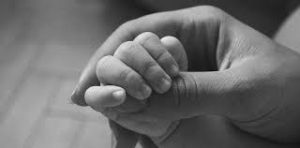
Prayer. It has religious connotations, of course, but the word is big-tent and willing to accommodate any plea to any higher force. Prayer can simply be a wish in hope’s clothing.
In the poem “Prayer,” Keetje Kuipers uses the second-person point of view with the pronoun “you.” Some readers object to this because “you” can mean an actual someone else and “you” can also mean a narrator addressing herself.
Me, I have no problem with it because, in my opinion, it works the way the reader wants it to work. That is, it gives the sense that a speaker may be referring to me personally, to everyone in the world, or to herself only. All good.
As for “Prayer,” it could be categorized as a sickness poem or a mother poem. But really, the two can be interpreted as one. Memories of mothers caring for us in childhood run strong. Deep as a tap root — so strong and deep that many people, delirious on their deathbeds late in a long life, call out for their mothers, even if that mother has been dead for too many decades to recall.
Both sad and haunting, that. But for now, let us pray:
Prayer
Keetje Kuipers
Perhaps as a child you had the chicken pox
and your mother, to soothe you in your fever
or to help you fall asleep, came into your room
and read to you from some favorite book,
Charlotte’s Web or Little House on the Prairie,
a long story that she quietly took you through
until your eyes became magnets for your shuttering
lids and she saw your breathing go slow. And then
she read on, this time silently and to herself,
not because she didn’t know the story,
it seemed to her that there had never been a time
when she didn’t know this story—the young girl
and her benevolence, the young girl in her sod house—
but because she did not yet want to leave your side
though she knew there was nothing more
she could do for you. And you, not asleep but simply weak,
listened to her turn the pages, still feeling
the lamp warm against one cheek, knowing the shape
of the rocking chair’s shadow as it slid across
your chest. So that now, these many years later,
when you are clenched in the damp fist of a hospital bed,
or signing the papers that say you won’t love him anymore,
when you are bent at your son’s gravesite or haunted
by a war that makes you wake with the gun
cocked in your hand, you would like to believe
that such generosity comes from God, too,
who now, when you have the strength to ask, might begin
the story again, just as your mother would,
from the place where you have both left off.
